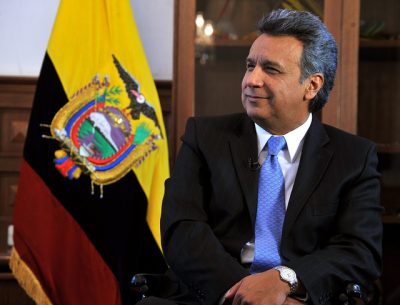Police State Ecuador Under Lenin Moreno

Former Ecuadorian President Rafael Correa and Moreno are world’s apart.
Correa expelled the Pentagon from his country, shutting down its Manta airbase, the region’s largest. Moreno invited what no country should tolerate on its territory to return.
Economist President Correa opposed IMF debt bondage. Moreno went the other way. Correa opposed privatization of oil, gas, water, electricity, and other government enterprises, what Moreno wants handed to corporate predators, most likely for self-enrichment.
Correa’s agenda included investing in public healthcare, education, and other social programs. Moreno believes anything government can do, business does better so let it, no matter how exploitive of and harmful to ordinary people.
According to Bolivarian Alliance for the Peoples of Our America (ALBA) Solidarity Committee member Stansfield Smith, Ecuador for a decade under Correa was “transformation(al).”
His predecessors (and Moreno) “instituted neoliberal austerity and privatization programs, prompting inequality, poverty and unemployment to soar.”
Correa went the other way,
“carr(ying) out programs that peoples in progressive social movements have advocated throughout the West if not the world.”
“Ecuador’s Citizens Revolution…arose from a popular repudiation of neoliberalism and neocolonialism, similar to Chavista Venezuela…”
A new constitution was overwhelmingly approved by national referendum. Correa called its adoption “a day of national celebration, a victory for the people, for democracy.”
Its provisions included progressive social policies, including respect for Ecuador’s indigenous people and natural resources.
Correa rejected predatory IMF and World Bank debt entrapment, demanding structural adjustment harshness. He renounced nearly $4 billion in toxic debt he called illegitimate, wanting the funds directed to popular needs.
He raised taxes on wealthy Ecuadorians to make them pay their fair share, along with instituting a tax on capital flight.
The nation’s central bank repatriated billions of dollars in assets held abroad, bringing them back where they belong. He renegotiated oil contracts with foreign companies on more favorable terms to Ecuador.
He tripled investments in infrastructure spending and public services for housing, along with free education and healthcare for all Ecuadorians.
He diversified the economy away from dependence on oil, increasing its exports in other areas. Throughout most of his tenure, Ecuador’s economy grew by over 4% annually.
He reduced poverty, unemployment, and socioeconomic inequality – an agenda Washington opposes wherever it exists.
During his tenure, Ecuadorian indebtedness to foreign creditors was among the lowest in Latin America.
He called universal healthcare and “quality, free public education…the basis of a real democracy” – what Moreno destroyed after taking office in May 2017, spurning every populist promise made, why he’s widely reviled.
On Tuesday, Ecuadorians marched en masse in Quito toward the Presidential Palace. Police accosted them violently, supporters of Rafael Correa’s Citizen Revolution party involved, along with others opposing hardline Moreno policies.
According to provincial coordinator for Loja of the Citizen Revolution Movement Marck Iniguez,
“we are here against the misgovernment that exists, as well as (Moreno’s) betrayal of the government plan for which he was elected.”
“Ecuador has been sold to the IMF, taking measures against the Ecuadorean people.” Progressive MP Jota Lloret added: “The government’s orders are ‘shut up and attack those who demonstrate against us.’ ”
“Repression is what we live now, but we can not be silenced and stopped. We are the people and together we will recover our homeland.”
Protesters displayed banners, saying: “Out with Moreno. Out with the traitor.”
In cahoots with the US and UK, Moreno invented phony reasons to rescind Assange’s citizenship and asylum status – agreeing to hand him over to UK authorities for extradition to the US, flagrantly violating international law.
Betraying Assange was in exchange for a $4.2 billion IMF loan (with onerous loan shark of last resort terms) and other favors granted him, selling his soul for the right price.
Ecuadorian attorney general’s office issued an Interpol red notice on former Foreign Minister Ricardo Patino, an Assange supporter/vocal critic of Moreno’s hardline rule.
Out of the country, he wants him detained and extradited to Ecuador for the “crime” of supporting truth-telling journalism the way it should be, calling his actions instigation and incitement — what police state rule is all about.
Interpol rejected a separate red notice for Correa’s arrest and extradition from Belgium where he’s living, calling it incompatible with human rights, the same true for wanting Patino prosecuted.
On Wednesday, he left Ecuador for Peru. It’s unclear if he’s there or headed to another country.
Ecuador under Moreno in cahoots with US, UK, IMF, and World Bank hardliners is unsafe and unfit to live in.
*
Note to readers: please click the share buttons below. Forward this article to your email lists. Crosspost on your blog site, internet forums. etc.
Award-winning author Stephen Lendman lives in Chicago. He can be reached at [email protected]. He is a Research Associate of the Centre for Research on Globalization (CRG)
His new book as editor and contributor is titled “Flashpoint in Ukraine: US Drive for Hegemony Risks WW III.”
http://www.claritypress.com/LendmanIII.html
Visit his blog site at sjlendman.blogspot.com.

